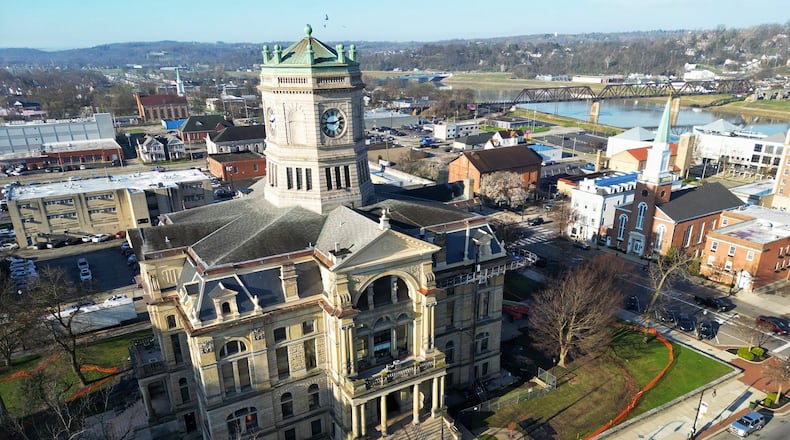The four-story structure cost $305,000 to build and was completed and occupied on Feb. 4, 1889.
The phased project began early last year and Phase 1 is wrapping up; the next step will begin next month. The final stage, that includes addressing the signature clocktower will start, next year. Commissioner Don Dixon said when the project is complete he wants to better utilize the building, “my intention is to put some people in there.”
He told the Journal-News they could possibly relocate the Water & Sewer and building departments in the restored courthouse, or any number of other county offices could be considered.
“If we’re spending that kind of money, if I’m associated with it we’re going to have an end game for it,” Dixon said. “And the taxpayers aren’t going to throw $5 million or $7 million at that thing and just drive by and say how pretty it is, we’re going to get use out of it.”
The courthouse is now home to the Probate and Area 2 courts and the Juvenile Court’s drug and alcohol treatment court.
Commissioner Cindy Carpenter said she and former Probate Court Judge Randy Rogers have discussed possibly creating a genealogy research site in the courthouse after restoration is complete, “there could be a good purpose for that courthouse.”
County Administrator Judi Boyko told the Journal-News the courthouse was not a big focus in the recent space utilization study — the commissioners are embarking on right-sizing their facilities — but it could be part of the plan.
“The space in the courthouse at this time is probably not being used as efficiently as it can be,” she said. “We did not really look at the courthouse space utilization as thoroughly in this recent space study, but as the exterior rehabilitation continues to progress, it certainly is something we need to look at.”
The commissioners promised for years to tend to the deteriorating building and made good on it in 2020, hiring THP Limited, Inc., a Cincinnati structural engineering and design firm, for $18,500 in August to survey the courthouse and recommend the best course of action for restoring the historic building. So far the commissioners have authorized $260.500 worth of contracts with their architects.
The initial THP report indicated if the project is completed as outlined, it should be another 25 years before more significant work is needed.
“The current conditions of the courthouse have caused the need to close off areas around the building due to concerns about falling debris. Staff and visitors regularly deal with leaks and deteriorating plaster,” the report read. “Until the repairs are completed, the deterioration will continue to grow and expand which will increase the final cost of the repairs and disturbance to courthouse operations during the work.”
THP recommended the following at a cost of around $1.5 million a year:
• Phase 1: Basement, porch roof, and mansard roof restoration
• Phase 2: Façade and roof replacement
• Phase 3: Courthouse roof and tower repairs
The county hasn’t just let the building molder away — repairs have been made inside and out through the years. The commissioners authorized spending $91,994 to replace the crumbling steps on the High Street side of the courthouse, the work was completed in September 2016.
Luke Field, restoration project manager for THP Limited, told the commissioners when restoration work started they found a lot of damage to the outside of the structure due to age, the elements and design of the building that didn’t provide adequate drainage. They are going through final punch list items now.
Phase 2 will address stone façade repairs and cleaning, some window repairs and work on the brick chimneys. He said this phase will also help determine if more extensive window repair or replacement are warranted in the next phase.
Replacing the windows was not part of the original job — some repair work was added to the contract — but officials said it might make sense to do it. Boyko told the Journal-News “it could be quite costly” but they don’t have cost estimates.
The final phase will include among other things: repair and painting of the terra cotta clocktower; interior repair of the stone chimneys in the attic space; asphalt shingle replacement with a metal roof and replacing the stone stairs with concrete on the east, west, and south sides.
Carpenter told the Journal-News previously she was concerned about the color of some of the repair work she has seen thus far. She wants to make sure everyone is taking a holistic approach to the appearance of the staged project.
“I’m always concerned as we fix one little thing here and one little thing there because it sometimes starts to look like a patchwork,” she said. “One concern seems insignificant, but it’s just all the different colors of concrete, if we’re going to do something next let’s make sure we’re looking at the overall aesthetics of the building.”
John Fabelo with the construction management firm LWC Incorporated — they are being paid $46,500 — said “one of our key roles is to make sure we’re working with the county, your team, making sure we’re making recommendations for colors that are historically appropriate for the courthouse and finishes.”
About the Author

